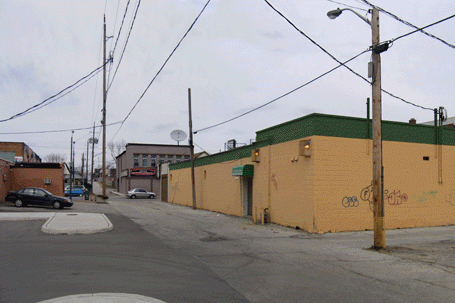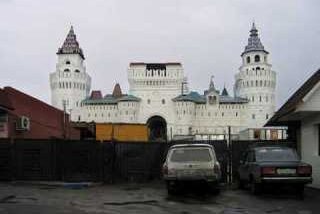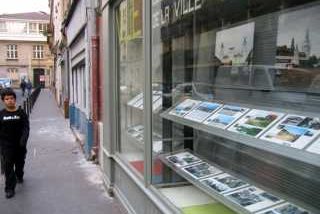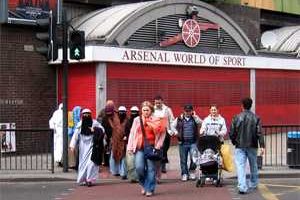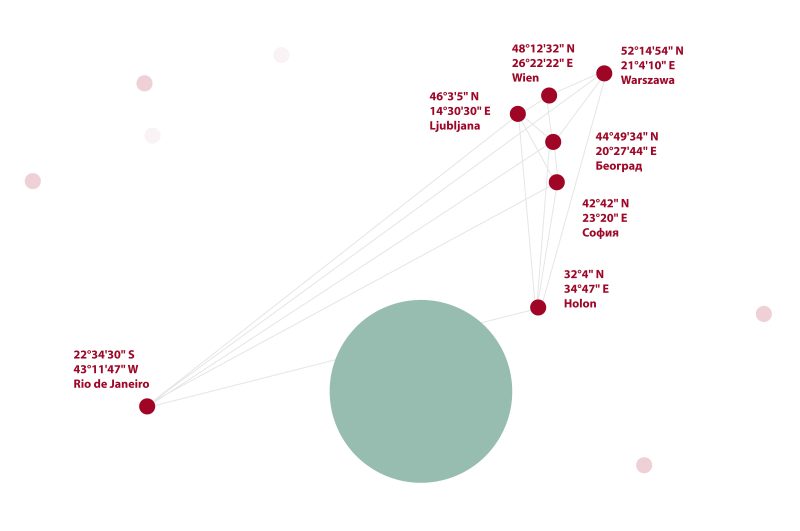- 10 October - 19 November 2008
- Open Space - Zentrum für Kunstprojekte, Vienna
NETWORKED CULTURES, Vienna
OPEN SPACE – ZENTRUM FÜR KUNSTPROJEKTE
Whether in the form of transnational politics, global economies, new working conditions or urban social movements, networks have become the most powerful figure of thought operating on the way we conceive the organisation of the world. Networks have changed our forms of cultural interaction and coexistence just as they have the way in which we produce and experience spaces.
The engagement with these developments on the part of art and architecture in recent years has resulted in a new form of praxis founded on collective production, process-guided work and transversal project platforms. Such a ‘disciplineless’ praxis of unsolicited intervention in spatial contexts renders legible the dysfunctional rules of planned spatial and cultural containment and creates an avenue for generating new forms of circulation amidst the political efforts to conceal this failure. It makes use of existing networks, expands and changes them, gives rise to new circuits and thereby sketches a mobile geography of self-determined utilization of space and culture.
The project NETWORKED CULTURES aims neither to present this development as a contained movement nor to localize it within the particularities of a specific geographic or institutional context. We are far more interested in its propinquity to a plethora of other self-authorized structures, irregardless of their scale – gray markets, informal commerce, alternative economies and migratory practices as well as the innumerable, minor, barely discernible attempts to establish self-determined sociality in the midst of the reconfiguration of our environments.
Opening: 9 October 2008, 7pm
CURATORS:
Peter Mörtenböck and Helge Mooshammer
ARTISTS:Judith AugustinovicUrsula Biemannhackitectura.net
Film by Peter Mörtenböck and Helge Mooshammer
Open SpaceZentrum für KunstprojekteLassingleithnerplatz 2Schwedenplatz1020 WienAustria
Exhibition open by appointment only, free admissionplease contact: office@openspace-zkp.org
supported byBM:UKKStadt Wien – Kulturabteilung MA 7
REVIEW
Franz Thalmair:Topographies of a networked world order: The »Networked Cultures« project in Open Space, Vienna,in: Springerin 1/2009
SAHARA CHRONICLES encompasses an undefined number of short videos documenting the present sub-Saharan exodus towards Europe. Taking a close look at the modalities and logistics of the migration system in the Sahara, the project examines the politics of mobility, visibility, and containment which lie at the heart of current global geopolitics.The material is gathered during three fieldtrips to major gates and nodes of the trans-Saharan network in Morocco, Mauritania and Niger where migratory intensity is bundled. No voice-over narrative strings these stories together. Meaning has to be extracted from the interstices between the documents, from the stretch of the journey that is most invisible to the eye.In their loose interconnectedness and their wide spread geography, Sahara Chronicle mirrors the migration network itself. It includes documents on Agadez in Niger, capital of the Tuareg and gate to the Saharan basin for the main migration routes coming from West Africa; Nouadhibou, the northern port of Mauritania located on the border to the Polisario Front/Western Sahara from where migrants leave on boats to the Canary Islands; Oujda on the Algerian border where desert crossers enter Morocco; and Laayoune in the Western Sahara, departure point for boats leaving to Spain.
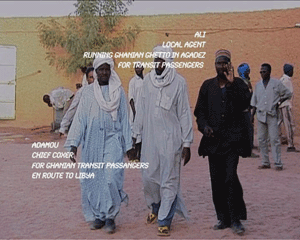
Ursula Biemann
SAHARA CHRONICLE | 2006-2007a collection of videos on mobility and the politics of containment in the Saharavideo (23 min.) and cartography
hackitectura.net is a group of architects, programmers and activists based in Seville (Spain), whose work deals with the creation of connected, participatory public spaces and infrastructures. Their performative CARTOGRAPHY OF THE STRAITS OF GIBRALTAR presents alternate visions of the border region connecting Europe and Africa.
It presents a map of “imperial” and “multitudinal” flows in conjunction with a strategic/tactical map showing socialgeopolitical networks and their common political project for the next years. The map is a communication and operation tool jointly authored by a large collaborative network which was part of Indymedia Estrecho, an activist and media network focussing on the “post-border” territory between Western Europe and Africa.
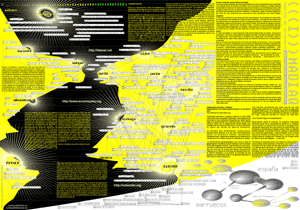
hackitectura.net
CARTOGRAPHY OF THE STRAITS OF GIBRALTAR | 2004cartography by hackitectura.net el al
Judith Augustinovic focuses in her work on the territorialisation and narrativization of spatio-bodily entanglements of (s)ex, trans/gender, sexuality and intimacy. Her installation SKINSHIP N°1 – hautnah traces a cartography of Luana Muniz, Travesti, Rio de Janeiro. Eu sou travesti. O travesti em si é uma invenção artística. A travesti é pura arte.
The vestimentary series is a close portrait of Luana Muniz: Travesti and citizen, prostitute and Mãe, activist and showgirl, shop owner… Inspired by the ambivalent, partially anachronistic, symbolic and intimate connotations of aprons as sexuated and sexual garment, the collection generates a snapshot of Luana Muniz’ transforming body and her parallel identities. Piece by piece, it draws a portrait of Luana Muniz and her spaces, and gives birth to a clandestine spatiality: the closet. The inversion out of/beyond the closet leads us into the closet: into the egocentric territoriality of clothing – part and supplement, expansion and presentation of the body – and its mobilisation as Nomadic Closet. A persistent trans-border construct, it refers to a movement outside heteronormative territories, to the loose threads that join together self-organised networks, and to Luana Muniz’s own migration across state borders on her extended business trips to Europe.

Judith Augustinovic
SKINSHIP N°1 – HAUTNAH | 2008vestimentary installation
The worldwide movement of populations, burgeoning social mobilizations and the incessantly changing form of the neoliberal economy are generating the energies of a new world order in which we are all constantly challenged to negotiate reality and make deals. Amidst this disintegration of traditional orders, access to networks and the development of connectivities are assuming an ever greater significance for the way we inhabit and configure our environments: The question as to what forms such connectivity should take is not only theoretical in nature but above all a question that points to the self-induced multiplicity of spaces that is continually generated by connectivities throughout the world and that in the process changes our own spaces of action and continually generates them anew.
The film NETWORKED CULTURES interrogates the meanings of this change together with the meanings of artistic, architectural and cultural engagement in these dynamics. It traces a variety of strands along which the Networked Cultures project itself has developed. First, attention is focused on the phenomenon of network creativity by following the routes of networks laid out by artists, architects, urbanists, curators and activists. The site that is hereby opened up marks an arena of engagement with the relationship between space and conflict and leads to an interrogation of contested spaces across Europe and beyond, examining the architecture of conflict, and discussing models of geo-cultural negotiation.
Investigating their modus operandi, the focus then shifts to governmentality and self-government by examining the organizational matrix of black markets, informal settlements and the accompanying parallel economy. Responding to these global realities, the parallel worlds of mobility and migration, ‘traveling’ communities, digital worlds and other counter-geographies are discussed in relation to a politics of connectivity and the emerging ‘archipelago of peripheries’.

Peter Mörtenböck and Helge Mooshammer
NETWORKED CULTURES | 2007
FOUR VIDEOS ON NETWORKED CULTURAL AND SPATIAL PRACTICES
video, chapters:Network Creativity, 25 min.Contested Spaces, 24 min.Trading Places, 25 min.Parallel Worlds, 31 min.
